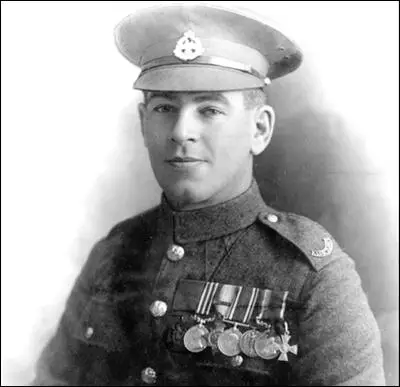John Bent
John Bent was born at Stowmarket on 18th March, 1891. His father, Spencer Bent, was serving with the Royal Horse Artillery, and was later to be killed in the Boer War. At the age of fourteen Bent enlisted with the East Lancashire Regiment. After spending four years in Ireland he was based in Woking (1909-12) and Colchester (1912-14).
On the outbreak of the First World War, Bent went as a member of the British Expeditionary Force to France, and arrived in time to take part in the battles at the Marne and the Aisne Valley. In September his regiment was moved to Ypres in Belgium.
On 21st October the Germans captured the village of Le Gheer. Bent was a member of the 11th Brigade sent to recapture the village. Heavy fighting took place over the next few days. Eventually the British soldiers gained the village but on the 27th October the Germans launched a counter-attack.
One of the British soldiers, Private McNulty, was shot after leaving the trench. As he was being fired at by the Germans, Bent volunteered to go out and bring him back. McNulty was over 25 yards away and Bent came under heavy fire as he dragged the man to safety.
Bent told the The Suffolk Chronicle: "Private McNulty went out of the trench, and on returning was hit in the pit of the stomach. He fell, and the Germans were trying to hit him again; you could see the earth flying up all around him. I said, 'Why doesn't someone go and help him?' and got the reply, 'Why not go yourself?' I went, and to make it difficult for the Germans to hit me I zig-zagged to him. They did not snipe at me while I was advancing, but as soon as I got hold of McNulty's shoulder something seemed to take my feet from under me, and I slipped under McNulty. This took place close to the walls of a ruined convent, and several bullets struck the wall. Knowing it was impossible to stand up, I hooked my feet under McNulty's arms, and using my elbows I managed to drag myself and him back to the trenches about twenty-five yards away. I got a bullet through the flesh of my right leg, and had to be taken to hospital."

Bent was awarded the Victoria Cross for his act of bravery. The medal was presented to Bent by King George V at Buckingham Palace on 9th December 1914. Bent had been wounded in the leg while rescuing McNulty and it took several months to recover. Promoted to the rank of Sergeant, Bent returned to the Western Front in the summer of 1916. Badly injured at the Battle of the Somme, Bent was sent home to England.
After recovering his health he returned to the Western Front and on 3rd November 1918, won the Military Medal for "bravery in the field". Company Sergeant Major Bent remained in the British Army after the war, serving in the West Indies and Malta before retiring in July 1925.
After leaving the army Bent became a janitor at Paragon School in the New Kent Road, London. Later he worked as a commissionaire for Courage, the brewers. In August 1968 Bent was invited to open a new Courage public house, The Victoria Cross, in Chatham, Kent. Bent stayed with Courage until he was eighty-five years old. John Bent died the following year on 3rd May, 1977.
Primary Sources
(1) John Bent was interviewed by The Suffolk Chronicle about his act of heroism (18th December, 1914)
Private McNulty went out of the trench, and on returning was hit in the pit of the stomach. He fell, and the Germans were trying to hit him again; you could see the earth flying up all around him. I said, "Why doesn't someone go and help him?" and got the reply, "Why not go yourself?" I went, and to make it difficult for the Germans to hit me I zig-zagged to him. They did not snipe at me while I was advancing, but as soon as I got hold of McNulty's shoulder something seemed to take my feet from under me, and I slipped under McNulty. This took place close to the walls of a ruined convent, and several bullets struck the wall. Knowing it was impossible to stand up, I hooked my feet under McNulty's arms, and using my elbows I managed to drag myself and him back to the trenches about twenty-five yards away. I got a bullet through the flesh of my right leg, and had to be taken to hospital.


